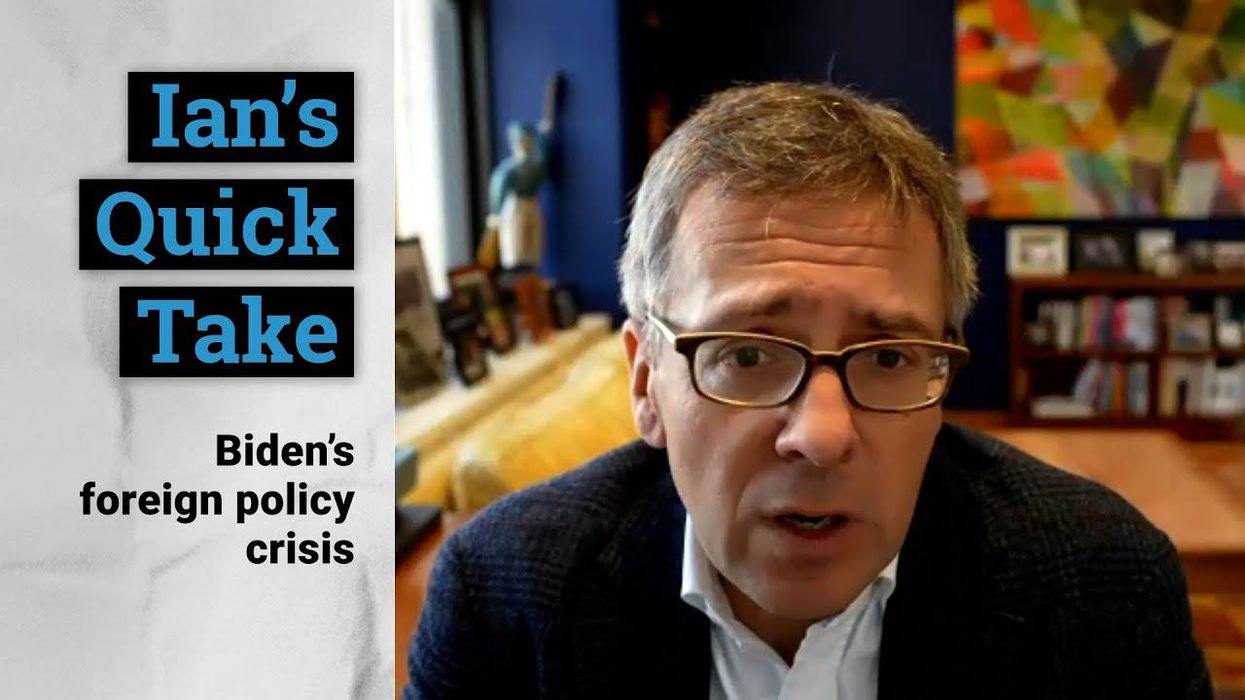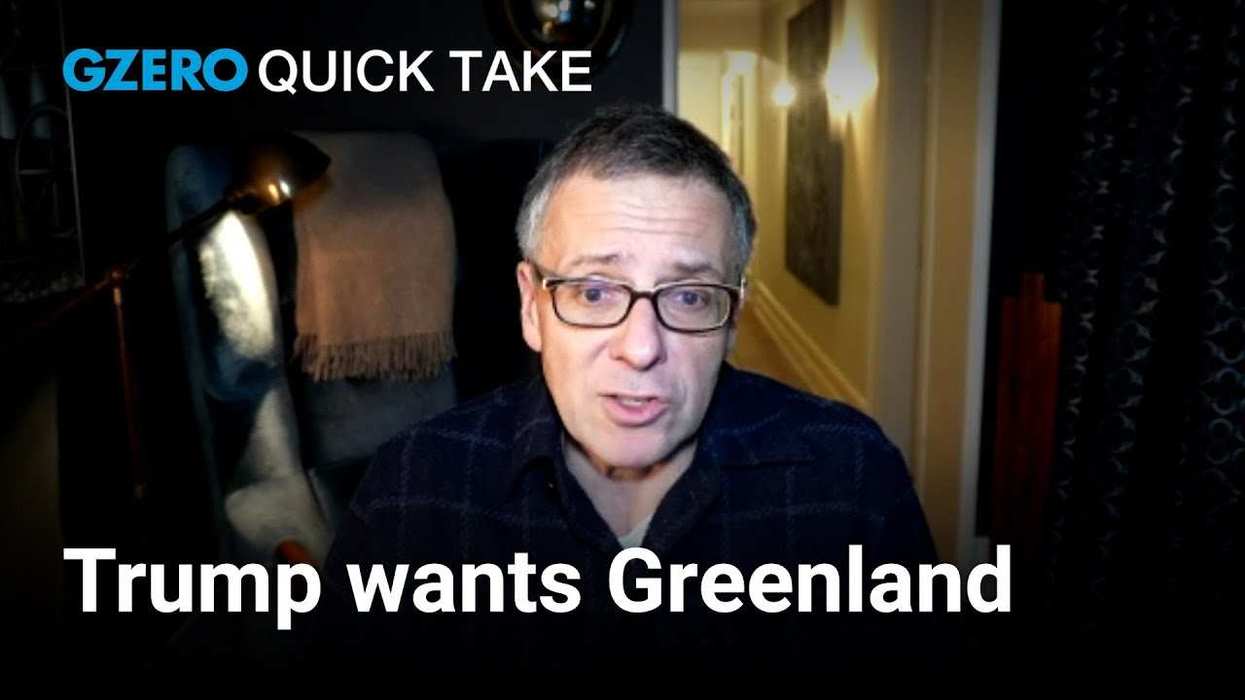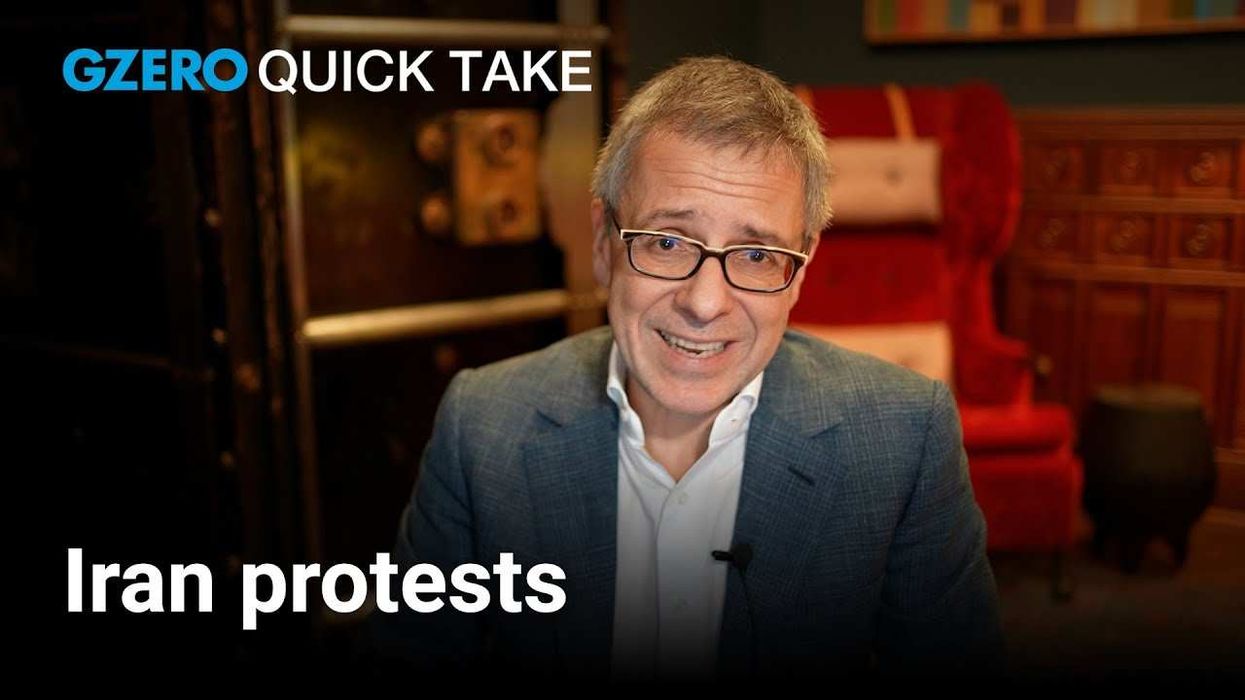VIDEOSGZERO World with Ian BremmerQuick TakePUPPET REGIMEIan ExplainsGZERO ReportsAsk IanGlobal Stage
Site Navigation
Search
Human content,
AI powered search.
Latest Stories
Sign up for GZERO Daily.
Get our latest updates and insights delivered to your inbox.
Global Stage: Live from Munich
WATCH RECORDING
Ian Bremmer's Quick Take: Hi everybody. Happy Tuesday after the long weekend for those of us that had a long weekend. I thought I would kick us off with the first major foreign policy crisis of the Biden administration. And that is of course, Russia-Ukraine. Afghanistan, of course, was a debacle, but not exactly a global crisis. This of course has the potential to really change the way we think about European security and about US relations with the other major nuclear power in the world. So, I would say that the level of concern is even higher and there are a lot of things we can say.
First, the last few days have mostly been escalatory. The last week of meetings between the United States and Russia, as well as NATO and Russia, it's good that the sides are talking, but there was not significant progress. The Russians made very clear that if you want to have more talks, we need a very quick written response to the demands they made publicly. So, you wouldn't say that there has been anything that looks like a diplomatic breakthrough.
And on the other hand, the messages that have come from the Russians in the last few days have mostly been escalatory. There's been cyberattacks against a number of websites in Ukraine belonging to government organizations, direct malware attacks against the number of government agencies, almost certainly from Russia. You see the Russians sending a bunch of troops to Belarus for sudden and non previously announced military exercises right on Ukraine's border and also now moving personnel from Russia's embassy in Kyiv. These are all signs that the Russians want the rest of the world to see that they are planning significant military activities in Ukraine.
On the other hand, it's really a bad idea for the Russians to go in and the costs that they would incur, both because the Ukrainian population on the ground is hostile to Russia, and there was consideration when they occupied Donbas, about taking further territory in Ukraine and one of the reasons they didn't do it is because they understood that that was going to lead to significant ongoing fighting. It would be unpopular in Russia and there'd be body bags and nobody wants to see that.
Now Putin's in a stronger economic position today. He might think that Biden's a little weaker, might think he's a little bit less likely to respond strongly. There's a new German chancellor in place who wants to engage directly with the Russians. Merkel's not there anymore. So, I understand why there might be more willingness to escalate. But still, a decision to do a full-on invasion of Ukraine is the one thing that is certain to bring the Americans and the Europeans together.
The one thing that is certain to revitalize NATO, which is an organization that's been floundering around for a lack of a mission over the past years. They would have a mission. That mission would be very much to defend against Russia and both the economic sanctions as well as the NATO military response, terms of more exercises, troops in the Baltics, positioning of forces closer to Russia's borders. All of that, I think, is something that Putin really wouldn't want to see. Would be very reluctant.
So, I personally think that there is a lower likelihood of overall full-scale invasion, takeout Zelensky, the tanks roll into Ukrainian territory. But I also recognize that every sign the Russians are sending points to very significant escalation.
So, there are two really big questions that we need to ask. The first is, is there a deal to be cut? Is it possible that diplomacy could actually bear some fruit and we can deescalate this? And secondly, if not, how big does Putin go? So, on the first question, I think it's worth remembering that when Biden met face to face with Putin in Geneva, the one big meeting back in June, they spent about two hours together, that was mostly Biden's agenda and there was one thing that Biden really put as a top priority to the Russian president. He said, "I've got a red line. You guys are allowing these criminal syndicates inside Russia to engage in cyberattacks against American critical infrastructure. And that's not acceptable. And I'm going to give you a few months to address it. But if you don't address it, there's going to be hell to pay. There will be direct retaliation from the United States. This is a really big issue for me."
Now, Putin heard that and over the course of the last few months, the Russians have addressed it. There's been markedly fewer Russian attacks, cyberattacks. And I'm not talking state-sanctioned, I'm talking criminal organizations against US critical infrastructure. It's very clear that the Kremlin actually did send that message. And indeed, last Friday on the same day that the Russians decided to engage in cyberattacks against Ukraine, they also announced that they had arrested some 14 people that were involved with the organization called REvil, R-E-V-I-L, which is the organization that was behind the Colonial Pipeline attacks. And the Russians said that that organization had been disbanded. So at the very least, this is a direct message to the Americans that when you said you had a big problem with us, we responded. That's obviously some kind of an opening of, "We say we have a big problem on Ukraine. Are you going to respond?"
Now, that doesn't mean that there is an adequate response to be had. That doesn't mean that there is an easy negotiation to be had, that doesn't imply that we're suddenly going to have a breakthrough, but it certainly implies that the Russian president, who is the single decision maker in determining whether or not this becomes war, is interested in a potential climbdown.
And my argument would be yes. And now we see if the two so are going to move in that direction. So, that's the first point. I'm more optimistic than anyone out there, I think, I'm seeing in the media that there is a desire on the part of the Kremlin to actually fix this if it's fixable and it's about Ukraine.
With the Ukrainian president, that let's face, is not the favorite of the West. This is a guy that's been arguing strongly for NATO membership and a membership action plan that he would never get support from the United States and Europe. He's also someone that's planning trumped-up house arrest, it looks like, of the former president, a domestic opposition to Zelensky, the Ukrainian president. This is closer to the Russian rule book in terms of the way they dealt with Navalny and not what he should be doing or supporting at a time that his country risks being invaded. Neither here nor there. But all of that makes me a little more optimistic.
But what if it doesn't work? Then are the Russians going to do something? And I think the answer is yes and the question is how big they go. In other words, I don't think Putin's bluffing. I think if he's not given something significant by the West. If there isn't a deal to be had over Ukraine, then there will be escalation. I don't think they're just going to back down like Iran where, when we killed Soleimani and suddenly they said, "Okay, we're not doing anything. Sorry, that was a bluff."
I don't think Putin's bluffing. But I'm not sure that what he's planning on doing is this all-out invasion for reasons I've discussed. It's very expensive. It will be unpopular in Russia. It will bring together NATO. And long term, I think it's going to be a real challenge for Putin to actually be seen as having a success in Ukraine. But I think that there are lots of things that they can do that would be successful for Russia that are smaller, that would be problematic for the United States and its allies. They've talked consistently about military and technical responses if their concerns aren't addressed. Technical's fairly obvious, we're talking about much bigger cyberattacks against Ukraine, which could be economically devastating to the country, remember the NotPetya attacks years ago, which probably took 1% of GDP off of Ukraine and people died in hospitals when the hospital suddenly had lost their ability to have data and connectivity. Those cyberattacks were big problem.
And I think they would easily do that again. If they want to defend Russian citizens in the occupied Donbas, they could roll tanks in. They could formally take that territory. They could maybe even annex it. It's interesting to me, that Belarus, in addition to these new exercises, the Belarus president has organized a referendum to change their constitution for February. How do you like that? And the February constitution, that's obviously going to pass because Belarus isn't a democracy, two of the changes are that they are no longer formally neutral and they're no longer a non-nuclear state.
In other words, quite a coincidence. Huh? In other words, the Belarusians could easily invite the Russians to put troops on their territory, which is an advance location for Russia, vis a vis Ukraine and also Europe, Eastern Europe, and also could station nuclear weapons on their territory.
And then finally, we've seen the Deputy Foreign Minister of Ukraine talking about, "Well, how would you like it if there were troops in Cuba or Russian presence in Venezuela?" And I think the Americans wouldn't like it at all. And I think it's quite feasible that the Russians would engage in some form of military activity there and you'd see more Russian activity on America's borders.
So, I think there's a lot they can do and part of the problem there is that the Americans can respond unilaterally, but it's not at all clear to me the Europeans would be responding with the US in terms of tough sanctions, in terms of Nord Stream 2, and in terms of NATO prepositioning of forces in return. I think there's an open question as to how far the alliance would go and how much there'd be a divide, with the Europeans much more reliant and their economy is much more reliant, especially in the winter on Russia if the Russians escalate, but that escalation is not a full-on invasion of sovereign Ukraine.
So anyway, a lot to watch. A very significant set of activities, mostly being driven by the Russians at this point, and very dangerous indeed. And so quite a lot to start off our week. I hope everyone's well, and we'll talk real soon. Be good.
For more of Ian Bremmer's weekly analyses, subscribe to his GZERO World newsletter at ianbremmer.bulletin.com
Keep reading...Show less
More from Quick Take
Quick Take
Feb 25, 2026
Has US–Iran diplomacy reached its end?
February 23, 2026
Supreme Court blocks Trump’s tariff power
February 20, 2026
Why Trump is pushing to take Greenland
January 18, 2026
US response to Iran protests
January 12, 2026
Maduro ousted in US raid, a major win for Trump
January 03, 2026
GZERO Series
GZERO Daily: our free newsletter about global politics
Keep up with what’s going on around the world - and why it matters.














